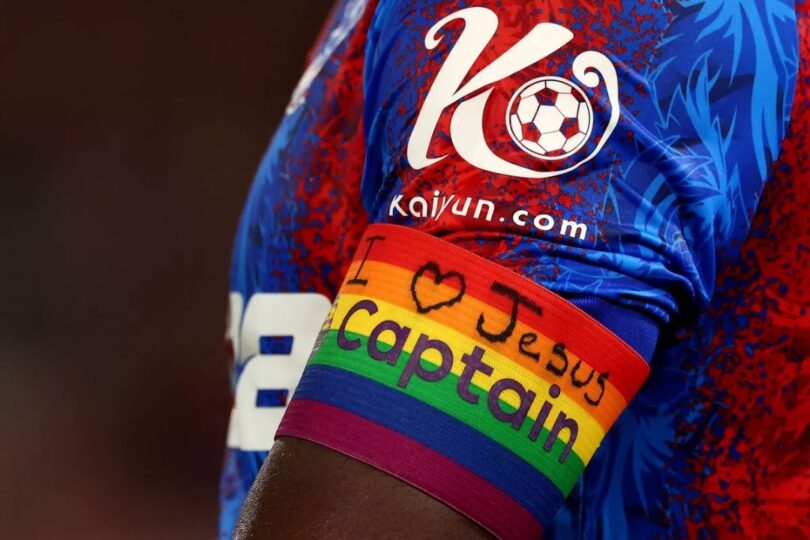Crystal Palace defender Marc Guehi has been cleared of any wrongdoing by the Football Association (FA) after wearing an armband featuring the word “Jesus” during a Premier League match. The incident, which gained attention from fans and pundits alike, occurred during Palace’s recent game, where Guehi donned the armband to pay homage to his Christian faith. Despite some speculation about whether this act violated FA regulations, the governing body has decided that no action will be taken against the England international.
This development brings an interesting intersection between football, personal expression, and governing rules. Guehi’s gesture was a reflection of his personal beliefs, but it also sparked debates on how athletes use their platforms to express themselves and whether such acts fall within or outside the boundaries of official guidelines.
The Incident: A Personal Tribute
Marc Guehi’s choice to wear the armband was not random. It was a deeply personal act, inspired by his Christian faith, which he has spoken about publicly in the past. The armband bore the word “Jesus” in bold, a symbol of his spiritual commitment and an acknowledgment of the influence of his faith on his life and career.
Footballers expressing their faith on the pitch is not a new phenomenon. From post-goal prayers to wearing messages on undershirts, religion has often played a visible role in the sport. Guehi’s armband, however, stood out as a bold and direct statement of faith. While many fans appreciated the gesture as a show of character and conviction, it also raised questions about whether such displays are permissible under FA regulations.
FA Rules on Messaging
The FA’s rules regarding messaging on kits are designed to maintain neutrality and prevent the game from being overshadowed by personal or political statements. Players are typically prohibited from displaying messages, slogans, or images on their attire that could be deemed controversial, political, or religiously divisive.
However, the FA also considers context when evaluating such incidents. In Guehi’s case, the message did not appear to be inflammatory or divisive. Instead, it was a personal expression of faith, not intended to provoke or alienate others. This distinction likely played a role in the FA’s decision not to pursue disciplinary action against the Palace defender.
Mixed Reactions From Fans and Experts
The incident generated mixed reactions across the footballing community. Many fans and commentators praised Guehi for staying true to his beliefs and using his platform to share a message of hope and positivity. Supporters saw it as an inspiring act, reflecting the values of faith, humility, and gratitude that often resonate with the broader football audience.
On the other hand, some critics argued that such displays, regardless of intent, could set a precedent that blurs the line between personal expression and the game’s rules. They suggested that allowing one player to wear religious messaging could lead to a flood of similar actions, potentially complicating the FA’s efforts to enforce neutrality on the pitch.
A Growing Debate in Football
Guehi’s armband is part of a broader debate in football about the balance between personal expression and regulatory compliance. Players often find themselves at the intersection of these two forces, as they seek to use their visibility to advocate for causes or beliefs close to their hearts.
Recent years have seen several instances of players making statements through their attire or actions, from tributes to social justice movements to commemorations of personal milestones. Governing bodies like the FA are frequently tasked with navigating these situations, ensuring the rules are upheld while respecting players’ rights to free expression.
Conclusion: A Gesture of Faith
The FA’s decision not to take action against Marc Guehi underscores the importance of context and intent when evaluating such incidents. By opting for a measured response, the FA has set a precedent for handling similar situations in the future, balancing the need for regulatory consistency with the acknowledgment of personal beliefs.
For Guehi, the episode serves as a testament to his character and faith. As one of Crystal Palace’s standout performers and an England international, he continues to inspire fans both on and off the pitch. The incident highlights how football remains a platform for players to express their values, creating moments of connection and dialogue that transcend the sport itself.
As the debate over personal expression in football continues, Marc Guehi’s armband is likely to remain a talking point. It raises questions not just about the boundaries of regulation but also about how the sport can celebrate the diversity of its players while maintaining unity on the pitch. For now, the incident has ended without controversy, but it has left a lasting impression on fans and the footballing world alike.







